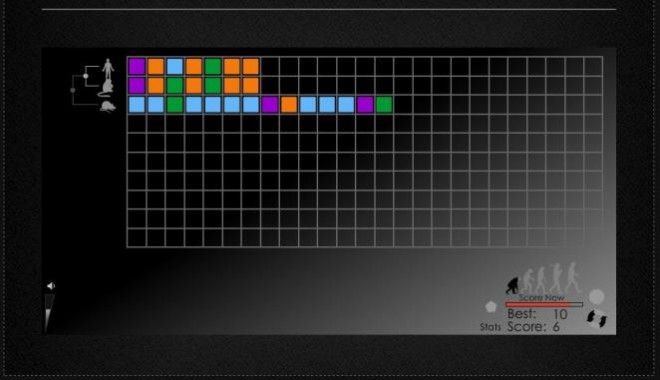Phylo: An Online Game Helps Genetic Research
A few days ago, the official launch of the new online game Phylo took place . This is a project in which scientists try to use the natural abilities of the brain of players to recognize images and solve puzzles (computers are still doing very poorly with this). Puzzles in the form of a game will help determine the origin of genetic diseases.

Phylo is not the first game of its kind. She stands on the shoulders of crowdsourcing games such as Foldit (coagulation of proteins) and Galaxy Zoo (sorting galaxies).
Players at Phylo move colored squares, which are four types of nucleotides in DNA, to find the best order in which they are arranged in terms of the similarity of the DNA of different animals. These similar sections of DNA are called promoters and are the launching pad for some important transcription. The search for the same promoters in humans and other animals helps to find the roots of various genetic diseases.
Unlike Foldit or Galaxy Zoo, the science in Phylo is very well hidden and the game looks exactly like a regular puzzle, with bright squares and nice music. This is not a minus, but the undoubted advantage of the game. That is exactly what scientific projects need to be done in order to be able to take part in as many as possible players far from science. The game is designed for those who otherwise would play in Farmville, says a leading developer Phylo Jerome Valdispul (Jerome Waldispuhl) from McGill University in Montreal.
The development team hopes to release versions of the game for smartphones and tablets, and someday build it into social networks like Facebook. The game already has its own page there.

Phylo is not the first game of its kind. She stands on the shoulders of crowdsourcing games such as Foldit (coagulation of proteins) and Galaxy Zoo (sorting galaxies).
Players at Phylo move colored squares, which are four types of nucleotides in DNA, to find the best order in which they are arranged in terms of the similarity of the DNA of different animals. These similar sections of DNA are called promoters and are the launching pad for some important transcription. The search for the same promoters in humans and other animals helps to find the roots of various genetic diseases.
Unlike Foldit or Galaxy Zoo, the science in Phylo is very well hidden and the game looks exactly like a regular puzzle, with bright squares and nice music. This is not a minus, but the undoubted advantage of the game. That is exactly what scientific projects need to be done in order to be able to take part in as many as possible players far from science. The game is designed for those who otherwise would play in Farmville, says a leading developer Phylo Jerome Valdispul (Jerome Waldispuhl) from McGill University in Montreal.
The development team hopes to release versions of the game for smartphones and tablets, and someday build it into social networks like Facebook. The game already has its own page there.
